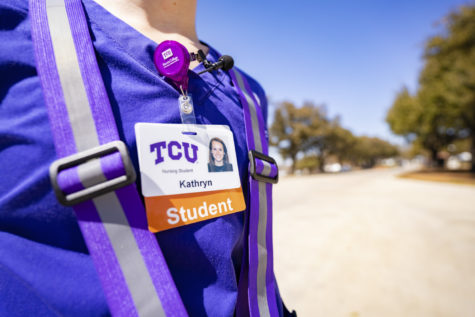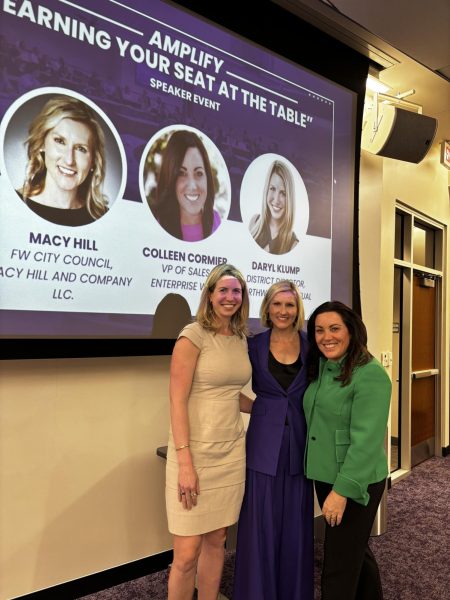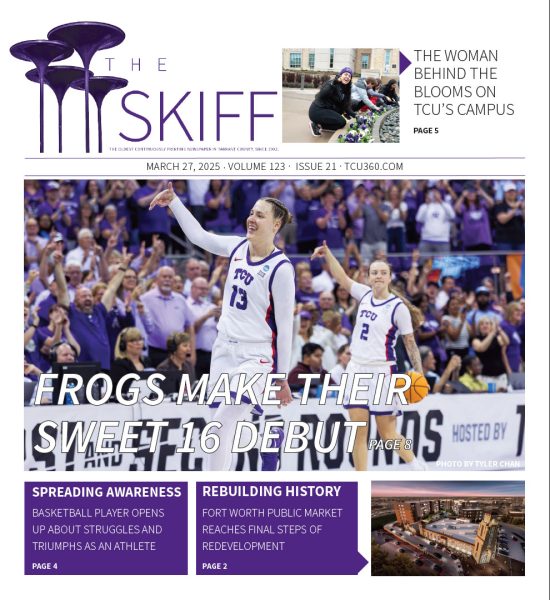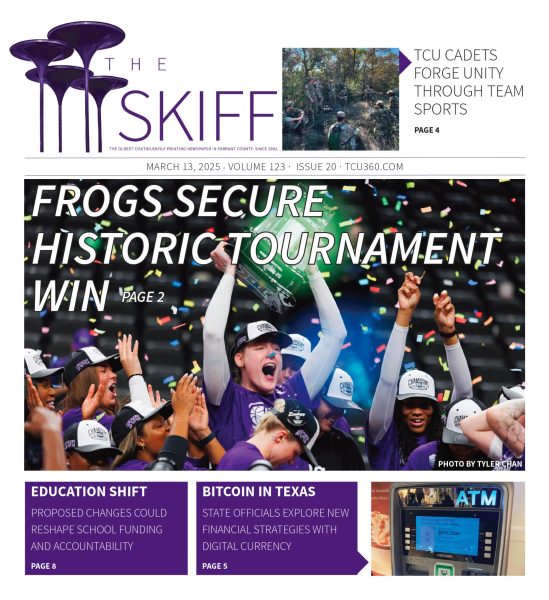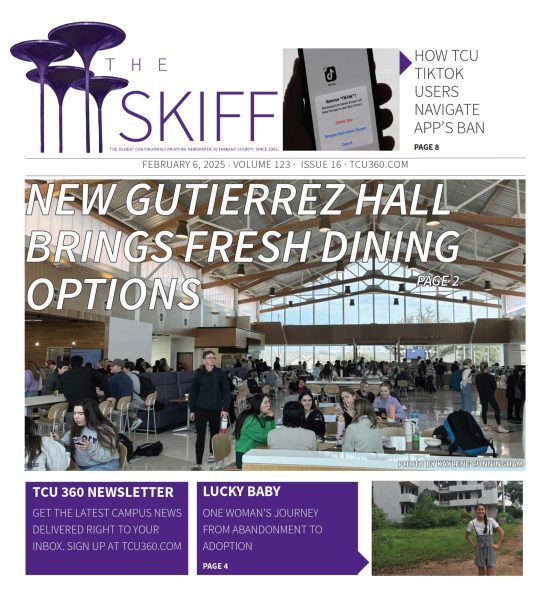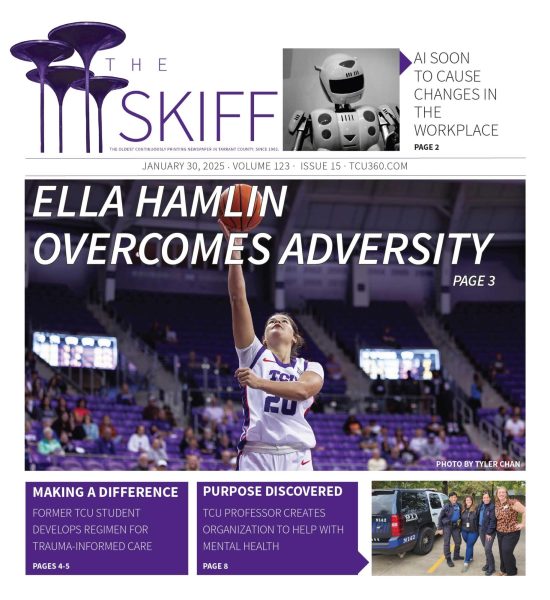Academics at TCU
A guide to academic resources and success on campus

Academic and writing resources help play a role in TCU’s retention rate
By Abby Hoffacker
Students have access to important academic resources that can help them succeed. Here are the details on the new academic services.
New academic services for students could mean a boost in TCU’s retention rate.
TCU’s retention rate has been stuck at the 90-91% mark since 2012, according to the TCU Factbook. That number may seem high, but in comparison to Texas schools like Rice University, 97%, and the University of Texas at Austin, 95%, according to U.S. News, TCU has room to improve.
New student resources and increased use of existing ones may just be the way to do that.
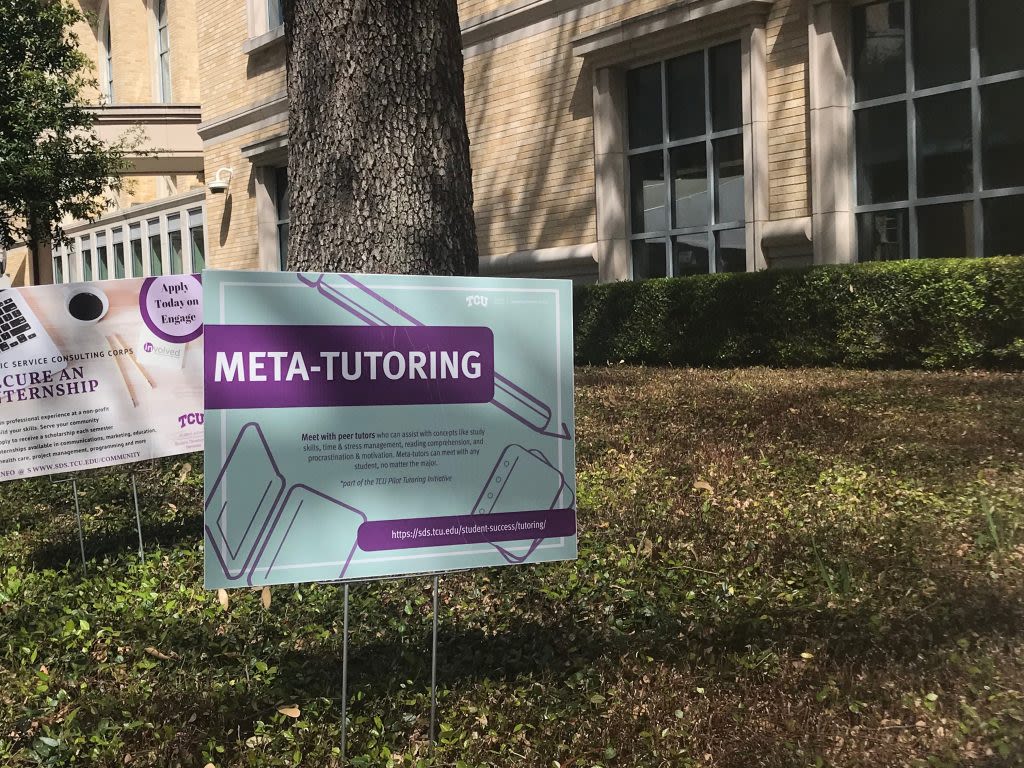
A yard sign outside Mary Couts Burnett Library advertises the new Meta-Tutoring program. (Photo courtesy of Abby Hoffacker)
A yard sign outside Mary Couts Burnett Library advertises the new Meta-Tutoring program. (Photo courtesy of Abby Hoffacker)
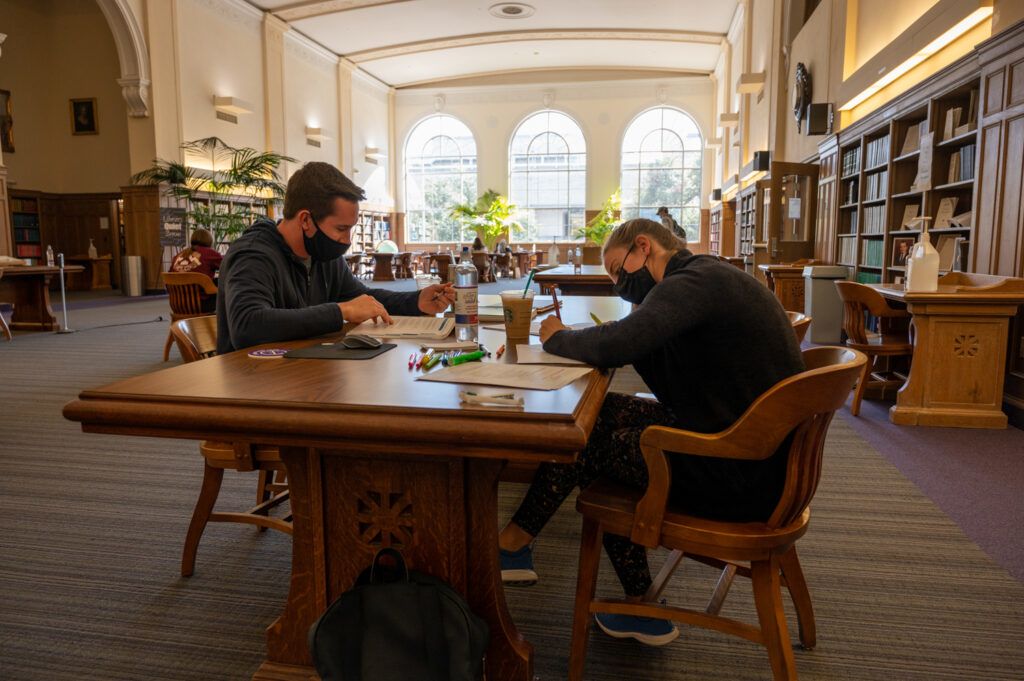
Students studying at TCU Library (Esau Rodriguez Olvera/Staff Photographer)
Students studying at TCU Library (Esau Rodriguez Olvera/Staff Photographer)
One new resource on campus is Meta-Tutoring, a fledgling tutoring program through Student Development Services.
“Originally we were going to call them super tutors, and that sounded a little funny, so I said what about Meta-Tutors?” said Brianne Varela, assistant director of the sophomore and junior year experience for Student Development Services.
The program helps students with study skills, time management, communication with professors and other campus resources, she said.
“Meta-Tutors can tutor a student regardless of their major or the classes they’re taking,” said Varela.
Meta-Tutoring is just one part of TCU’s new tutoring program, which launched in January.
“A lot of people maybe didn’t realize we didn’t have a centralized tutoring program [at TCU]… and they are excited … and hope to see it continue,” said Varela.
The program is still in its pilot phase, working on accreditation from the College Reading and Learning Association.
“We obtained a list of courses that had high drop or withdraw or failure rates, [and] those are the classes we identified as really needing tutors,” said Varela.
The Pilot Tutoring Initiative is currently holding tutoring sessions on Zoom but hopes to offer the choice of online or in-person sessions for fall 2021.
Prior to this initiative, students sought out tutoring through other departments and programs. One example is TCU’s Student Support Services, a program through the U.S. Department of Education’s TRIO initiative. SSS offers tutoring and other support resources for students who qualify.
“It is harder for me to ask professors for help [with classwork],” said Lexi Carrizales, a sophomore nursing student. “Someone reached out to me … [saying] ‘Hey I know about SSS, I want to introduce you to it,’” she said.
The program has helped her in classes and beyond.
“Other than tutoring stuff, they give tips on other classes … and good advice,” Carrizales said.
Photo 1: Student studying at TCU Library
(Esau Rodriguez Olvera/Staff Photographer)
Photo 2: Students study in the library while wearing face coverings. (Heesoo Yang/Staff Photographer)


Another pre-existing academic resource is the TCU Writing Center, which has been on campus since 1988.
“A place where people could come with any writing project … ranging from dissertation chapters to letters home begging for money,” said Steve Sherwood, director of the center since 2002.
The center offers one-on-one online tutoring and writing workshops, in addition to brainstorming and techniques to overcome writer’s block.
“You don’t even have to have something with you when you come to the writing center,” said Peter Christopherson, a second-year political science student and peer tutor at the center.
Christopherson uses the writing center services for his own work as well.
“When I notice things in my own writing that I do without thinking … that’s super helpful when I teach others,” he said.
With the writing center’s wide range of experts, the description of the staff sounds like the opening line of a joke.
“One retired English professor, a Minister, two PhDs,” said Sherwood. Not to mention, three novelists, an art historian and an inductee to the Georgia Writers Hall of Fame.
But students shouldn’t be afraid to come in, he said.
“My number one rule of this place [for the staff] is to be nice … it’s not like a punitive experience,” Christopherson said.
The center expects to meet in person for the fall 2021 semester.
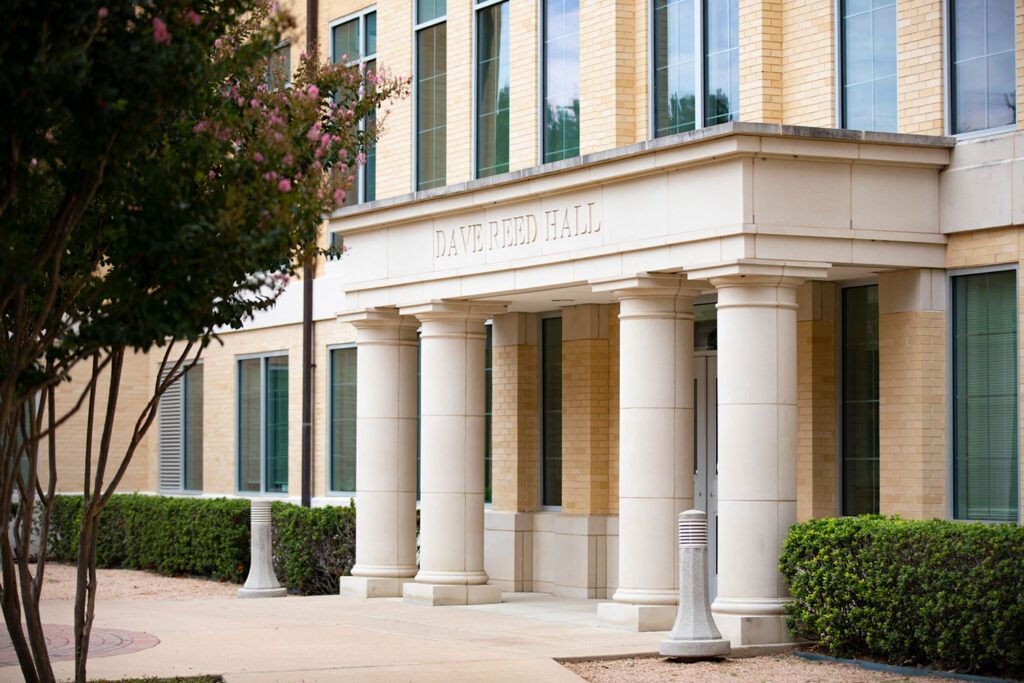
Reed Hall is where the physical Writing Center is located. (Heesoo Yang/Staff Photographer)
Reed Hall is where the physical Writing Center is located. (Heesoo Yang/Staff Photographer)

The writing center is a great resource for students to have their papers before turning them in (Brandon Ucker/ TCU 360).
The writing center is a great resource for students to have their papers before turning them in (Brandon Ucker/ TCU 360).
Looking upwards
During the 2020 academic year, TCU’s retention rates made some improvement.
“The freshman retention rate is 91.7%, up slightly from 2019’s 91.3%. The retention rate among transfer students is 83.6% compared with 82.7% last year,” according to a TCU news statement from October 2020.
“Attracting and retaining such highly qualified students during an unprecedented year with unforeseen challenges, speaks to the highly strategic efforts made to connect with our students virtually, TCU’s academic reputation and the unrivaled TCU experience,” said Chancellor Boschini in the announcement.
Introduction to University Life class introduces new students to TCU
By Ariel Wallace
First-year students have a lot to learn in their first semester at TCU. This class provides students with helpful resources and connections to put students on a path to success.
Introduction to University Life (UNLF) is an one-credit-hour student success seminar for incoming TCU students.
The course connects first-year students to campus resources and helps them make the transition into college life. The University Life course is focused on providing knowledge and skills to help students transition into the academic community at TCU.
“Students are introduced to fundamental questions and issues of the university experience — the nature and purpose(s) of higher education at TCU: critical thinking, how to study for and reflect upon course material and experiences, academic and personal integrity, setting learning goals, diversity and inclusion in the academic community, responsibility-taking, stress and time management, exploring campus resources and developing life-long learning habits,” said the Assistant Dean of Interdisciplinary Studies Dr. Zoranna Jones.
UNLF is taught by self-selected faculty and staff members, along with an upperclassman student peer guide. Instructors are given a similar course syllabus and allowed to adjust the way the information is presented depending on the instructor's personal style.
Peer Guides serve as mentors and role models for new students in the course. They work with faculty members to facilitate conversations and exercises.
“I was in UNLF as a freshman, and I remember seeing how my Peer Guide interacted with students, participated in class discussions and was really there to make us feel welcome. My Peer Guide acted as a role model for all the things I wanted to continue to do when I was a Peer Guide,” said Madison Seaman, early childhood education major and second-year Peer Guide.
Seaman said she focused on making sure students were engaging and learning from the different lessons taught in class.
Mentoring is another important aspect of University Life. Students receive one-on-one mentoring from both the instructor and peer guide.
“I think the mentoring aspect is beneficial to incoming students because it allows them to connect with someone who has recently been in their same shoes," Seaman said. "They can share tips from what they went through, give advice, make connections, show learning experiences, etc. I think that when reflecting back on our college career, we all have a lot that we wish we knew going into our freshman year.”
Jones emphasizes the benefits of having both an instructor and Peer Guide for first year students.
“Having both the faculty and peer guide will allow students to gain knowledge and build a relationship with both. The experiences and expertise will vary but all are valuable to the student experience. The peer guide serves as a mentor, resource and role model," Jones said.
UNLF started in 2014 and has expanded from 18 sections to 89 sections last fall. It is a one-credit-hour course that is open to all first-year students, including transfer and non-traditional students.
“This course isn’t required for most majors (exclusion is Music majors), just strongly encouraged. I would just explain that this course has been developed truly with first-year students in mind, by discussing topics and concepts that assist with the transition to college," Jones said. "It has also been developed to create a community and sense of belonging for first-year students.”
Seaman said she thinks all incoming students should take the course.
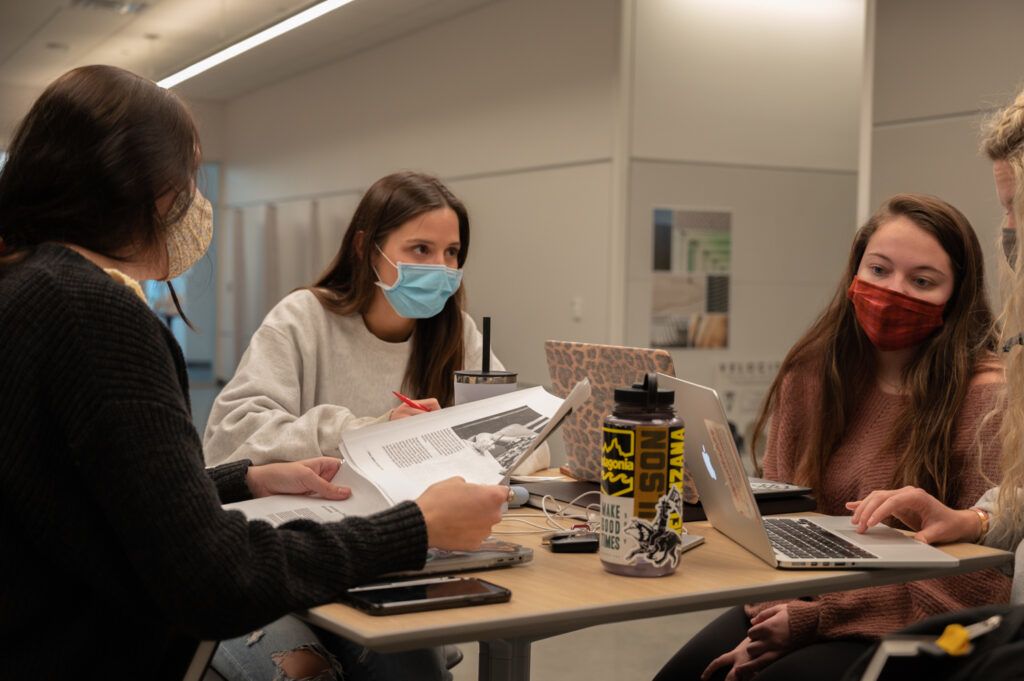
Socially distanced studying in FAB. UNLF teaches students useful study tools. (Esau Rodriguez Olvera/Staff Photographer)
Socially distanced studying in FAB. UNLF teaches students useful study tools. (Esau Rodriguez Olvera/Staff Photographer)
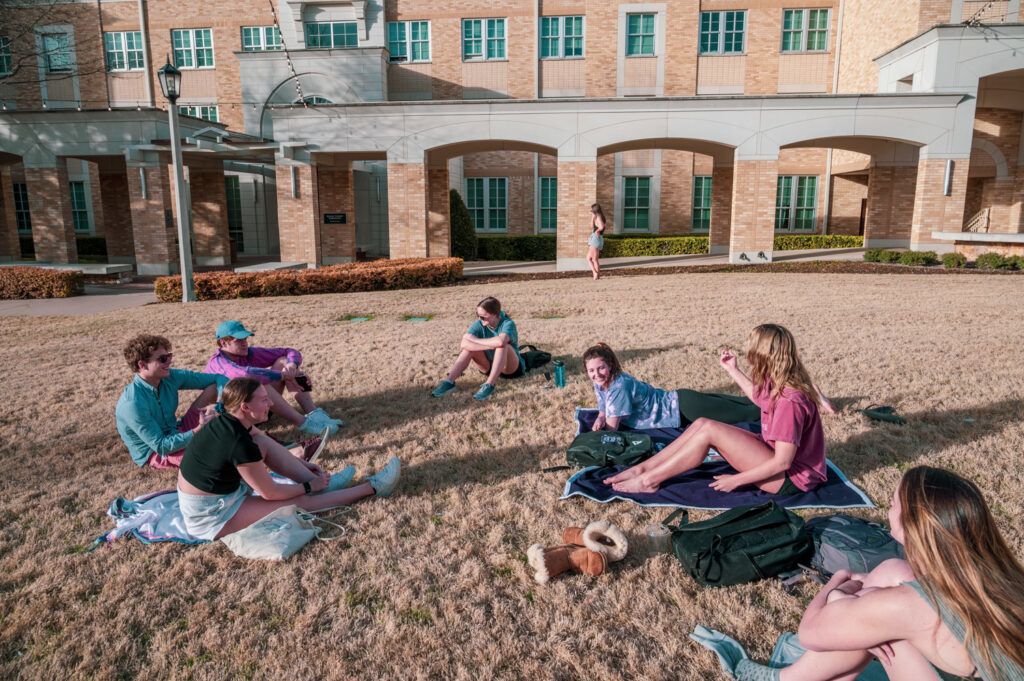
Students laying in grass in the commons. UNLF helps students bond.
(Esau Rodriguez Olvera/Staff Photographer)
Students laying in grass in the commons. UNLF helps students bond.
(Esau Rodriguez Olvera/Staff Photographer)
The course not only lays out all the resources on TCU’s campus but allows students to stay connected with what is happening on campus, gives them time to reflect on what the transition to college is like and provides tips on time management, stress management and study tips. It also pushes students to recognize the different backgrounds that TCU students come from as well as reflect on their own identities.
"This is an amazing program to help incoming students become integrated into not only TCU’s campus but college in general,” Seaman said.
Introduction to University Life (UNLF 10211) will have several sections available for first-year students to take in Fall 2021.
Become a leader before landing on campus
By Kiaya Johnson
It's never too early to start making a difference on campus. Here's how to get involved as a leader at TCU.
When it comes to leadership, students can expect to receive many lessons outside of the classroom.
Those students involved in the Leaders for Life program (L4L) start working with the development opportunity before stepping foot on campus.
Leaders for Life is a selective leadership development program offered to first-year students through TCU’s Student Development Services.
Based on a student’s admission application, high school involvement and leadership potential, an email is sent the summer prior to a student’s first year at TCU to apply to be a part of the program. The program intentionally selects students that derive from underrepresented communities and populations.
This program recruits about 150 students per cohort. This program prides itself on being diverse, intentional and less time-consuming.
The program requires each student to attend various workshops throughout the semester, meet with their mentors, and advisors for check-ins, guidance and resources. The time commitment of this program sits at about six to eight hours per semester.
Reggie Jennings and Kate Bentley currently serve as coordinators for L4L, where they oversee 300+ students. Next year, the program is projected to reach 500 members.
The responsibilities and roles are broken up between the students’ classification.
First-year students are welcomed with a Kick-Off Celebration, where they meet their mentors, enjoy food and play games.
Sophomore students attend a Sophomore Getaway Retreat for an off-campus exploration of resilience through various workshops and activities.
Juniors and Seniors encounter mentorship training and preparation workshops for life post-graduation.
This four-year program offers a $500 dollar stipend per year. Participation throughout all four years is not mandatory. Each student is given the option to renew their contract and the end of each semester if one wishes to withdraw from the program.
“My favorite part about this program is having a mentor," said Madison Obregon, a member of the executive board. "Having someone in your specific major to connect with and receive recommendations for classes, study tips, and balance is the best. It has definitely helped me thus far."
Jennings and Bentley said their favorite part of overseeing the program is witnessing the light bulb go off for students and the huge transformation over the years.
Exploring student job opportunities on-campus
By Ryann Booth
Working while being a student can be challenging. Here are some on-campus jobs that offer the flexibility students need to be able to work and succeed academically.
TCU offers a number of opportunities for students to earn money or other benefits while keeping a college student’s bustling day in mind.
Committing to a job, even if it is part-time, can raise some concerns for students as most off-campus jobs can be time consuming.
Additionally, many jobs don’t revolve around the stresses that come with being a college student such as tests, quizzes, homework and club activities. Looking for a part-time job that gives enough wiggle room for a busy college student’s schedule can be challenging.
Students who are looking for a job can visit the Frog Jobs sector of the Handshake website to browse all of the available jobs that are posted sporadically by departments throughout the academic year.
Each department has its own timeline for posting on Handshake based on their individual needs, so students should check as often as they can.
“If you have a department you are interested in working for, you may contact them directly for information on their expected openings for next year,” said Celeste Lindell, MBA, the assistant director of employer development at TCU.
Some popular student jobs and their descriptions are listed below.
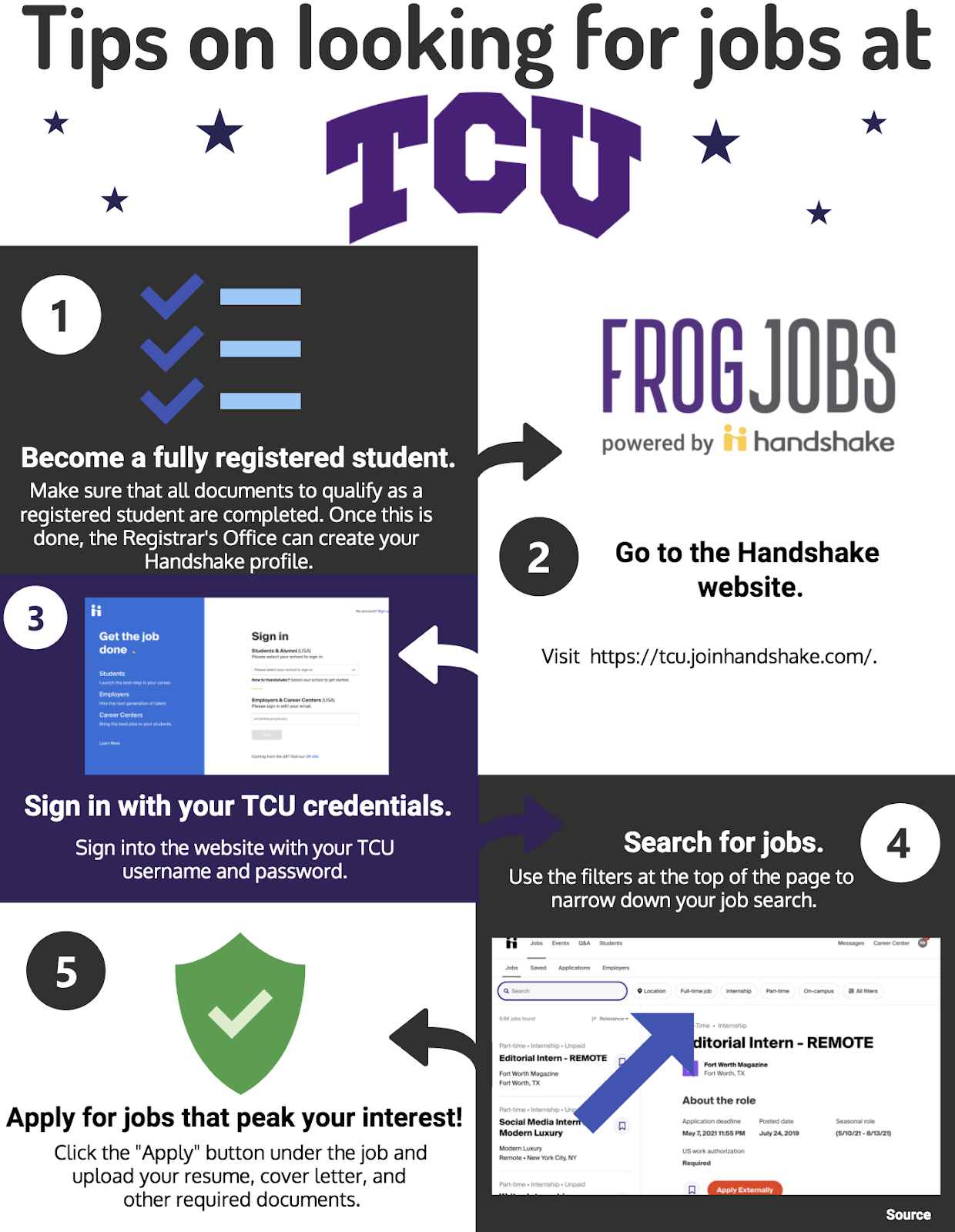
Residential Assistant
A residential assistant, or RA, is one of the first people to greet residents when they arrive on campus.
RAs are like the interior decorators of a house. They decorate the residential halls with uplifting posters and holiday-themed decorations, plan fun events for their residents to get to know each other and ensure the safety of all residents.
They help turn TCU from a college into a home.
Some of an RA’s duties include room checks, weekly staff meetings and on-call rotations.
Janie Kimball, a senior speech language pathology major, is an RA in Hays Hall in Greek Village.
“The best parts about being an RA shine through really simple interactions,” said Kimball. “The RA role is relational and one that is really geared towards being a person who knows others, connects people to other people and empowers them to have the best possible experience at TCU.”
An RA’s compensation is not a weekly paycheck. RAs are compensated with a single room (based on availability) and a Market Square Membership or Ultimate Flex Meal Plan.
For more specific information about qualifications and eligibility, visit the Housing website.
Residential Desk Assistant
TCU desk assistants are like the front desk receptionists of a hotel.
They welcome residents with a smile every time someone enters the residence hall and help residents rent out any supplies they might need.
A desk assistant position is work-study eligible and allows for students to complete homework during their shift when no one needs assistance.
Olivia Egloff is a sophomore psychology and sociology major who works as a residential desk assistant in Hays Hall.
“My favorite thing about my job is definitely making friends with the residents,” said Egloff. “I also love being part of such a relaxed environment.”
She said she chose the job because she knew she could get homework done during her shifts.
Desk assistants are required to work a minimum of eight hours per week and receive a compensation of $8/hr during daytime hours (9:00 am – 12:00 am) and $9/hr during nighttime hours (12:00 am – 3:00 am).
For more specific information about qualifications and eligibility, visit their website.
Information Desk Assistant
An information desk assistant job is very similar to the residential desk assistant.
They are responsible for greeting and providing informational assistance to students, faculty and guests within the information desks located at the Brown-Lupton University Union and King Family Commons Building.
This is another job that is work-study eligible.
An information desk assistant receives a compensation of $8.25/hr.
For more specific information about qualifications and eligibility, visit their website.
Rollin’ n Bowlin’ Blendista
Rollin’ n Bowlin’ is a restaurant located in the BLUU that offers healthy food options for students and promotes “healthy vibes.”
Blendistas are responsible for making and serving orders of açaí bowls, avocado toast and smoothies to customers.
Ellen Bayliss is a sophomore supply chain management and finance major who works at Rollin' n Bowlin' as a blendista.
“My favorite part about working for Rollin' n Bollin’ is being able to see and talk to a lot of people while I work,” said Bayliss. “My friends come by and get smoothies quite often, so it’s fun to see them throughout the day.”
The application requires the submission of a resume and a class schedule so class and work are never a conflict.
A blendista receives a compensation of $8.25/hr.
Admissions Intern
Admissions interns are people who are passionate about their Frog pride and enthusiastic about their love for TCU.
They are in charge of guiding visitors, parents and potential Horned Frogs around campus and telling them all there is to know about TCU.
Felice Johnson is a sophomore nursing major who works as an admissions intern.
“My favorite thing about my job is sharing the pride and joy I feel being a part of the TCU community,” said Johnson. “I am so passionate about this school and all it entails, and I love to introduce it to prospective students and parents alike.”
Johnson said there is no greater gift than watching students find their home away from home.
“The admissions staff is a second family to me and they make going to work everyday a prize,” she said.
Positions are posted on Handshake as there is availability.
Peer Writing Consultant at the Writing Center
Students who have a knack for English and grammar often work as peer writing consultants for the Writing Center.
Peer consultants meet with students via Zoom for 30-minute appointments to read their papers and help improve their assignments.
According to the Writing Center website, peer consultants work closely with senior staff to develop their repertoire of tutoring and writing skills and grow as young professionals.
For more information, visit their website.
University Recreation Center Jobs
Many students on campus enjoy participating in intramural sports, working out in the weight room and utilizing the facilities in the University Recreation Center, such as the pool or the rock climbing wall.
The rec center offers a variety of jobs for students of many interests.
Jobs in the rec center that are specifically reserved for students include membership services, weight room monitor, front office, lifeguard, intramural official, climbing wall attendant, adventure trip program staff and accounting assistant.
Alondrah Vazquez is a first-year fashion merchandising major and part of the member services staff at the rec center.
The community at the rec center is very warm and welcoming, said Vazquez.
"Working at the rec allows me to build new connections and strengthen relationships with people across campus," she said.
For more information, visit the rec center website.
TCU Athletics
When most people think about student involvement in TCU Athletics, they think about the student athletes.
However, there are many other students involved in TCU Athletics.
It takes many moving parts to make everything in the department function smoothly, so the Athletics Department hires several students to help out with the programs.
Student jobs in the Athletics Department include positions in academics, communications, facilities, football staff, football video, front desk, inside manager, laundry manager, on-field/on-court manager, marketing, sports nutrition, student-athlete development, tennis center, ticket office, video and weight room.
Daniel Ruelas is a sophomore business information systems and finance major who works for the football video team as a part of the film crew.
“Working for the Athletics Department makes me feel like I’m a part of something greater than myself,” said Ruelas. “I love helping the team improve with my film.”
Ruelas said the job also comes with many travel experiences he otherwise would not have taken part in.
The student worker application form can be found on their website.
TCU Phonathon Caller
A TCU Phonathon caller keeps alumni, parents and friends informed about the successes and updates of TCU and the Brite Divinity School.
Phonathon callers gain marketing, customer service and persuasive communication skills by working for the Phonathon program.
They are responsible for establishing relationships with alumni, raising support for TCU, negotiating philanthropic abilities, troubleshooting concerns and performing minor clerical duties.
Cali Bradsher is a speech pathology major from Minneapolis, Minnesota who works as a Phonathon caller.
“When I was looking for a job on campus, I wanted to find one that would give me some customer service experience,” said Bradsher. “I would have to say that this is my favorite part about working at the Calling Center.”
The Calling Center is part of the Office of Loyalty Giving located on the first floor of Sadler Hall, and the compensation is $8/hour with a minimum of 8 work hours per week.
The student worker application form can be found on the university advancement website.
TCU Campus Store
Working for the TCU Campus Store is not directly through TCU, but it is still technically on campus.
Students have the option of being a team member or barista at the Starbucks in the store. Team members work to ensure excellent customer service to both students and shoppers.
Starbucks baristas are in charge of taking and making food and drink orders for customers.
Contact the TCU Campus Store for more information.
TCU Pilot Tutoring Initiative
Peer tutors help students identify specific challenges, establish new ways to address them and provide feedback about their progress.
All peer tutors must complete a 10-hour training program in accordance with the requirements of the College Reading and Learning Association certification program.
Claire Marie Papac is a sophomore strategic communications and modern language studies major who works as a French peer tutor.
“I chose the job because I love the language and want to help others understand French, have more confidence in their bilingual abilities and enjoy speaking it,” said Papac.
Students should contact the dean of the college in which they wish to be a peer tutor if they are interested.
Froggie 5-0 Driver
Froggie 5-0 is a student safety escort service that provides safe rides on golf carts to members of the TCU community who are injured or do not feel safe walking through parts of campus.
Rides operate between 8:00 p.m. and 1:00 a.m. during the fall and spring semesters.
Omega Stallworth is a senior health and fitness major and has worked as a Froggie 5-0 driver for the past four years.
“This job is one of the best on this campus because we get to serve the students directly and provide them with safe transportation to their destination,” said Stallworth.
Students can apply for this position on the Handshake website or by picking up an application at the TCU Police Station on Lubbock Ave.
Alumni Timeline
The knowledge, connections and experiences TCU students gain help them navigate the real-world. Here are some alumni who have gone on to lead successful careers.
Photo: Graduation 2021 (TCU Facebook)







